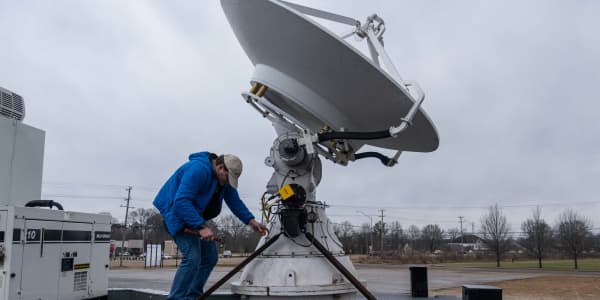When Marc Gorlin launched his firm Roadie, he knew Georgia was the ideal place to find the talent he needed to launch his on-demand app. Gorlin, who previously co-founded the financing company Kabbage, says the attractive cost of living in the state and access to "smart, talented people in multiple industries" make it attractive.
Abundant financing has also helped. His company, which lets consumers ship goods in the cars of people who happen to be driving to the intended destination, raised $15 million in venture capital in a Series B round in June that included Eric Schmidt's angel group TomorrowVentures.
Georgia is among many states that are working hard to lure businesses of all sizes — and entice them to stay put.
The state, which finishes eighth overall in this year's America's Top States for Business rankings, also notches an impressive sixth-place finish in our Access to Capital category. Not only did Georgia businesses attract $837 million in venture capital financing last year but the state is also in the top 10 for small-business lending, according to 2013 figures from the U.S. Small Business Administration.
There's no one set formula that makes a state business-friendly, say business owners and experts. Rather, it is a mix of ingredients that, when combined, make a state an attractive place to set up shop.
Some states that look unfriendly to business on paper are actually doing quite well in attracting firms of all sizes. For instance, California has a high cost of doing business — the second highest in the nation based on our study — thanks in part to strict environmental and labor regulations. It can also be an expensive place for workers to live, given high housing prices. Its 13.3 percent state income tax is the highest in the country, according to the Tax Foundation. Nonetheless, the state is home to thriving start-up hubs in Silicon Valley and San Francisco. California finishes 32nd in our study overall yet manages second-place finishes for Technology and Innovation and Access to Capital.
"If you talk with businesspeople, they'll say California doesn't have a particularly friendly business climate, but at the same time, it's still a huge economy, and there are a lot of really good companies out there," said Bob LaBombard, CEO of GradStaff, a Minneapolis, Minnesota-based staffing firm. "A lot of those economic factors outweigh the regulatory climate there."
At the same time, states with generous incentives and tax breaks are sometimes less appealing to business than they seem.
"Often, but not always, the states that offer the more aggressive incentives have to for some reason," said Katie Culp, the Indianapolis-based president of KSM Location Advisors, a firm that advises clients about economic development incentives, location analysis and economic development opportunities in 48 states. "They could be lacking in good infrastructure or in large or qualified labor pools. They need to offset some of the negatives on the checklist."
Plus, some incentive programs are hard to tap into because they are so complex, according to Culp. Some packages offered in South Carolina and Tennessee "look tremendous," said Culp, "but when you dig into the details, there are a lot of caveats that limit the companies' ability to take full advantage of some of those programs."
Here are five important factors that make states attractive to business, according to experts and entrepreneurs.
Vibrant college towns. States that are home to cities with a strong university network — and a lifestyle that makes college graduates want to stay — have an edge in attracting businesses that need talent, said LaBombard.
California fares well in this regard, he said. "Los Angeles and San Francisco are go-to cities for college grads," he added, pointing to Texas as another example: "Austin and Dallas are very vibrant." That shows up in our Workforce category, where Texas finishes in eighth place — a major factor in the Lone Star State's No.2 overall ranking.
Utah's abundant talent pool of recent college graduates helped lure Nate Quigley to Provo three years ago to co-found Chatbooks, a site where users can create photobooks, with his wife, Vanessa. He moved from the Melbourne, Florida, area, where he launched his last start-up. With one of the most educated workforces in the nation based on U.S. Census data, Utah finished 12th for Workforce in our ranking.
Salt Lake City is home to universities such as University of Utah, while Provo is home to Brigham Young University and Provo College. "That just fills the state with lots of great talent," said Quigley.
As a result, Quigley has been able to staff up quickly to 30 full-time employees and 40 part-timers. The company hit $5.9 million in revenue in 2015, he said.
Some states have created formal initiatives to connect local universities to employers. In Georgia, for instance, the High Demand Career Initiative, launched under Gov. Nathan Deal, connects Georgia's public university system and the Technical College System of Georgia so educators can hear from the private sector about what skill and degrees are needed. That way, they can create relevant programs, said Chris Carr, commissioner of the Georgia Department of Economic Development.
After finding out from the state's burgeoning film industry that there was a need for trained crew members, the state created the Georgia Film Academy to train workers with production skills in January 2015. "We've had 15 different companies locate in our state since 2011," said Carr.
Abundant financing. Although venture capital deal-making has slowed down, states such as California — which led the country in total venture capital invested in 2015, according to the Moneytree Report by PricewaterhouseCoopers and the National Venture Capital Association — have an edge because of their vibrant investing scenes. So do New York, No. 2, and Massachusetts, No. 3. In terms of small-business lending — the other key element in our Access to Capital rankings — California is tops in overall dollars, and it is in the top third in terms of funds per employee.
States with smaller entrepreneurship hubs also have an advantage. This is especially true in Colorado, where Boulder has an active investing scene, and Utah, where investors are abundant, thanks to the start-up culture in cities such as Salt Lake City and Provo.
One draw for Quigley in launching Chatbooks in Provo was the lively venture capital scene in Utah. His firm has raised $8 million in seed and venture funding — $2 million from two local institutional seed-stage investors, and $6 million from Signal Peak Ventures, a venture capital firm based in Salt Lake City. Utah businesses attracted $732 million in venture capital last year.
"That's what I love about Utah," said Quigley. "We're able to attract the financing we needed to grow the company all right here in Utah."
Low taxes. States that lower the tax burden on companies and individuals have a definite edge in attracting businesses, say experts. It's one of the things we consider in our Cost of Doing Business category, with the help of analysis from the Tax Foundation.
For 2016 the top 10 states with the most business-friendly tax climate, according to the Tax Foundation, were, starting with the best:
- Wyoming
- South Dakota
- Alaska
- Florida
- Nevada
- Montana
- New Hampshire
- Indiana
- Utah
- Texas
Texas has attracted many corporate relocations because of its tax climate, noted Holland O'Neil, chair of the board of directors at Gardere, a law firm based in Dallas. The state — the second-biggest state economy in the United States after California — doesn't have a corporate income tax, state property taxes or individual income taxes, O'Neil said, adding, "Texas is very attractive for business."
Among the relocations are Toyota, which plans to establish its headquarters in Plano and move workers from locations in California, Kentucky and New York by early 2017, for instance. Meanwhile, Liberty Mutual Insurance, based in Boston, expects to open a campus in Plano in 2017.
Some states are competing for the most favorable tax climate. Carr of the Georgia Department of Economic Development noted that Georgia eliminated the state's sales tax on energy use in manufacturing to bring new growth to that industry. "We've seen a real resurgence in manufacturing as a result," he said.
Support for Main Street businesses. Becky Sturm has moved around the United States, but when she decided to open StormSister Spatique in 2005, a business that sells beauty products, like her own vegan lipstick brand, she had no doubt that her home state of Minnesota was the ideal location. She sells her wares through an e-commerce store and pop-up retail.
"They really took the shop local and shop small movement to heart," said Sturm. And it's not just government and larger businesses that are supportive of small firms, she said. "The shop local movement is really strong here with consumers."
Tapping into that energy, Sturm has co-founded a pop-up market called The HAMMS Event, short for Help a Minnesota Maker Succeed, which just took place in June. She also founded Lower Town Pop, a market held in Union Depot in downtown St. Paul, an event that gets some city and state support that helps with marketing. "They were looking for someone to host markets or events," she said. "I pitched my idea to them, and they loved it."
Even better, she has found there is money flowing to small businesses like her own. When Sturm needed funding, she was able to find two local investors. "There is a lot of VC money here in the Twin Cities," she said. With one employee other than herself, her business now brings in between $150,000 and $200,000 per year, she claims. Minnesota — last year's Top State — ranks fourth overall this year and 21st for Access to Capital.
Easy transportation. States need to have an up-to-date, well-maintained transportation infrastructure — including well-connected interstates and highways, rail lines, airports and port shipping — to compete in attracting business, according to "Area Development," a publication that covers topics such as site selection and ranks states on their business climate.
Indiana tops our Infrastructure category this year. Its roads and bridges are in excellent shape according to U.S. Department of Transportation data, linking the state known as the Crossroads of America to both the Midwest and Northeast. The state has robust ports on Lake Michigan, and a busy international airport in Indianapolis. Other Top States for infrastructure include Tennessee, Texas, Georgia and Minnesota.
Some states are also recognizing that improving workers' commutes is important to staying competitive — and taking action to improve their trek to work. With Atlanta facing major congestion in some areas, the legislature increased the gas tax, a hike that took effect last July. "We now have an additional $10 million over the next 10 years to address roads, bridges and congestion problems," said Carr. "A lot of states and cities talk about congestion. We are funding the plan and executing on that plan. Our governor and legislature deserve a lot of credit."
— By Elaine Pofeldt, special to CNBC.com
Note: This story has been updated to include the 2016 data from CNBC's "America's Top States for Business."





